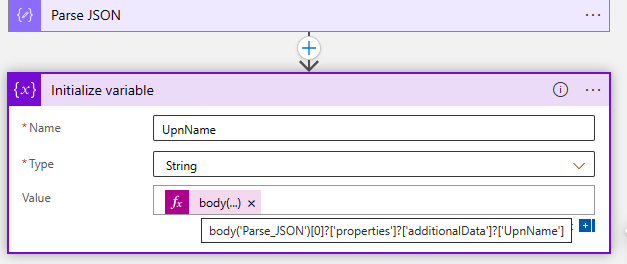@Koonnamchok Klongkaew Thanks for reaching out.
I am assuming that your Entities is the JSON array. Please correct me if my understanding is correct.
You can navigate to any of your previous run history and copy the output Entities and I think it should be something as below which you haven't shared the full output of arrays.
[
{
"name":"xxxxxxxxxxxx",
"type":"Microsoft.SecurityInsights/Entities",
"kind":"Account",
"properties":{
"accountName":"xxxxxxxxxxxx",
"ntDomain":"xxxxxxxxxxxx",
"upnSuffix":"xxxxxxxxxxxx",
"sid":"xxxxxxxxxxxx",
"aadTenantId":"xxxxxxxxxxxx",
"aadUserId":"xxxxxxxxxxxx",
"isDomainJoined":"xxxxxxxxxxxx",
"displayName":"xxxxxxxxxxxx",
"dnsDomain":"xxxxxxxxxxxx",
"additionalData":{
"Sources":"[\"ActiveDirectory\"]",
"AdUserId":"xxxxxxxxxxxx",
"GivenName":"xxxxxxxxxxxx",
"IsDeleted":"xxxxxxxxxxxx",
"IsEnabled":"xxxxxxxxxxxx",
"IsSensitive":"xxxxxxxxxxxx",
"UserType":"Member",
"UpnName":"xxxxxxxxxxxx",
"SyncFromAad":"xxxxxxxxxxxx"
},
"friendlyName":"xxxxxxxxxxxx"
}
},
{
"name":"xxxxxxxxxxxx",
"type":"Microsoft.SecurityInsights/Entities",
"kind":"Account",
"properties":{
"accountName":"xxxxxxxxxxxx",
"ntDomain":"xxxxxxxxxxxx",
"upnSuffix":"xxxxxxxxxxxx",
"sid":"xxxxxxxxxxxx",
"aadTenantId":"xxxxxxxxxxxx",
"aadUserId":"xxxxxxxxxxxx",
"isDomainJoined":"xxxxxxxxxxxx",
"displayName":"xxxxxxxxxxxx",
"dnsDomain":"xxxxxxxxxxxx",
"additionalData":{
"Sources":"[\"ActiveDirectory\"]",
"AdUserId":"xxxxxxxxxxxx",
"GivenName":"xxxxxxxxxxxx",
"IsDeleted":"xxxxxxxxxxxx",
"IsEnabled":"xxxxxxxxxxxx",
"IsSensitive":"xxxxxxxxxxxx",
"UserType":"Member",
"UpnName":"xxxxxxxxxxxx",
"SyncFromAad":"xxxxxxxxxxxx"
},
"friendlyName":"xxxxxxxxxxxx"
}
}
]
Now in you Parse JSON action you should see the Use sample payload to generate the schema and paste your previous run history action so the schema is generated for your correctly.
Now you will have the tokenized value that you can use it in your next actions. As your Json is array so either you need to use the for each action to get the individual value of upnname and displayname.
But in case your json output has only one array element so you can use the below expression to access the zeroth element of the array.
body('Parse_JSON')[0]?['properties']?['additionalData']?['UpnName']

Let me know if you need any assistance.
Please 'Accept Answer' if it helped so that it can help others in the community looking for help on similar topics.



